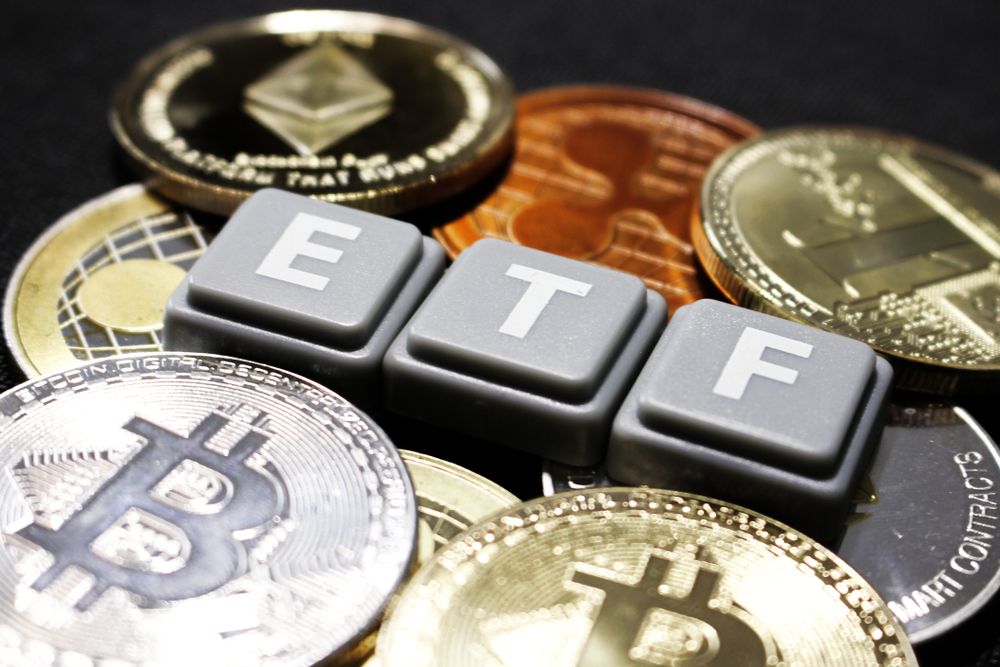A bitcoin exchange-traded fund (ETF) lets traders gain exposure to BTC via traditional stock markets, without needing to directly buy or sell the digital asset on a cryptocurrency exchange.
A bitcoin ETF is an exchange-traded fund that specifically tracks the price of the leading cryptocurrency and allows traders to purchase or sell the security on a stock exchange throughout the day. They can be cash-settled or physically settled, meaning investors will receive either fiat currency or actual bitcoin upon exiting, respectively.
ETFs are regulated traditional financial products and can be bought through a number of retail-friendly mobile trading apps, including Robinhood, Trading212, TD Ameritrade and Fidelity. The most popular ones track major stock indexes, such as the Standard & Poor’s 500 Index, or other traditional assets and commodities like oil and gold.
Bitcoin ETFs have been a hot topic in the crypto space for many years, ever since the Winklevoss twins’ “COIN” bitcoin ETF filed with the U.S. Securities and Exchange Commission (SEC) in 2013 was rejected. It was widely believed that a bitcoin ETF would usher in a new wave of institutional investment into the crypto industry, bringing much-needed maturity and stability to the market. Seven years on, however, the SEC still has yet to approve a bitcoin ETF despite dozens of proposals from multiple companies including a second Winklevoss Twin ETF in 2018, one from Bitwise, five from Direxion, two from GraniteShares and many more.
The main arguments given by the SEC for these repeat rejections have been that the bitcoin market is too volatile, lacks sufficient surveillance and is too easily manipulated.
Things may be about to change, however, as Canada’s financial regulator, the Ontario Securities Commission (OSC), recently approved the world’s first two bitcoin ETFs in quick succession. The Purpose Bitcoin ETF (BTCC) and the Evolve Bitcoin ETF (EBIT) are both physically settled ETFs and have applied to be listed on the Toronto Stock Exchange. TradeBlock, a CoinDesk subsidiary, is the index provider for the Purpose ETF.
With the arrival of a bitcoin ETF in North America, many are optimistic the SEC will follow suit soon in the United States especially if Gary Gensler, former commissioner of the Commodity and Futures Commission (CFTC) and MIT blockchain tutor, is confirmed by the U.S. Senate to replace former SEC Chairman Jay Clayton.
“My guess is we get an ETF this year,” says Mike Novogratz, CEO of Galaxy Digital and former colleague of Gensler at Goldman Sachs in the late 1990s.
“Gary taught a class on blockchain at MIT and on crypto. He understands it cold. He’s progressive, right? And progressives broadly are going to go after … the rent takers. Crypto is not a rent taker… Crypto is trying to disrupt the rent takers.”
Bloomberg Senior ETF analyst, Eric Balchunas, tweeted his support for the new bitcoin ETFs, adding, “U.S. usually follows shortly after. Good sign for U.S. bitcoin ETF.”
Sui Chung, CEO of CF Benchmarks, also anticipates pressure will now be on the SEC to follow suit. “Now that the OSC has said that if a product is well constructed enough the crypto market is sufficiently mature for these types of financial products, the industry’s attention inevitably turns south of the border to the U.S.”
Bitcoin ETF FAQs
Who can invest in ETFs and how do you trade them?
You don’t need to be an accredited investor to purchase ETFs. Anyone can invest in them.
All you need in order to begin investing in ETFs is to set up an online brokerage account or download one of the many mobile trading apps. From there, you’ll be able to buy and sell a wide range of ETFs that track a number of different markets. A list of leading mobile trading services can be found here.
What are the pros and cons of trading ETFs?
While it might seem counterintuitive to invest in a bitcoin ETF rather than buy actual bitcoin, there are a number of advantages to doing it this way, namely:
- No need to go through the process of having to store crypto safely yourself
- Buying an ETF through an online broker is significantly more secure, faster and less prone to outages than purchasing digital assets directly from a crypto exchange
- There are much clearer tax implications and guidance for traditional financial products than digital assets
- Stock exchanges are more liquid than crypto exchanges so it’s much easier to buy and sell ETFs
There are, however, a number of disadvantages to investing in a bitcoin ETF as opposed to buying the asset directly.
- ETFs can only be bought and sold during market trading times, whereas crypto markets run 24/7. This means that if the price of bitcoin moves sharply, you could potentially have to wait hours before you have the chance to offload to buy up more.
- It’s free to hold your own bitcoin but ETFs charge management fees.
- Buying ETFs requires you to complete know-your-customer (KYC) checks but bitcoin can be bought anonymously peer-to-peer.
- ETFs require you to trust third-party custodians.














